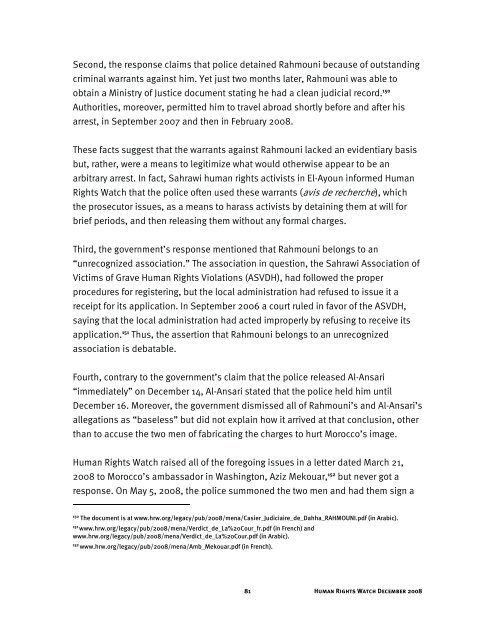Download full report with cover - Human Rights Watch
Download full report with cover - Human Rights Watch
Download full report with cover - Human Rights Watch
Create successful ePaper yourself
Turn your PDF publications into a flip-book with our unique Google optimized e-Paper software.
Second, the response claims that police detained Rahmouni because of outstanding<br />
criminal warrants against him. Yet just two months later, Rahmouni was able to<br />
obtain a Ministry of Justice document stating he had a clean judicial record. 150<br />
Authorities, moreover, permitted him to travel abroad shortly before and after his<br />
arrest, in September 2007 and then in February 2008.<br />
These facts suggest that the warrants against Rahmouni lacked an evidentiary basis<br />
but, rather, were a means to legitimize what would otherwise appear to be an<br />
arbitrary arrest. In fact, Sahrawi human rights activists in El-Ayoun informed <strong>Human</strong><br />
<strong>Rights</strong> <strong>Watch</strong> that the police often used these warrants (avis de recherche), which<br />
the prosecutor issues, as a means to harass activists by detaining them at will for<br />
brief periods, and then releasing them <strong>with</strong>out any formal charges.<br />
Third, the government’s response mentioned that Rahmouni belongs to an<br />
“unrecognized association.” The association in question, the Sahrawi Association of<br />
Victims of Grave <strong>Human</strong> <strong>Rights</strong> Violations (ASVDH), had followed the proper<br />
procedures for registering, but the local administration had refused to issue it a<br />
receipt for its application. In September 2006 a court ruled in favor of the ASVDH,<br />
saying that the local administration had acted improperly by refusing to receive its<br />
application. 151 Thus, the assertion that Rahmouni belongs to an unrecognized<br />
association is debatable.<br />
Fourth, contrary to the government’s claim that the police released Al-Ansari<br />
“immediately” on December 14, Al-Ansari stated that the police held him until<br />
December 16. Moreover, the government dismissed all of Rahmouni’s and Al-Ansari’s<br />
allegations as “baseless” but did not explain how it arrived at that conclusion, other<br />
than to accuse the two men of fabricating the charges to hurt Morocco’s image.<br />
<strong>Human</strong> <strong>Rights</strong> <strong>Watch</strong> raised all of the foregoing issues in a letter dated March 21,<br />
2008 to Morocco’s ambassador in Washington, Aziz Mekouar, 152 but never got a<br />
response. On May 5, 2008, the police summoned the two men and had them sign a<br />
150 The document is at www.hrw.org/legacy/pub/2008/mena/Casier_Judiciaire_de_Dahha_RAHMOUNI.pdf (in Arabic).<br />
151 www.hrw.org/legacy/pub/2008/mena/Verdict_de_La%20Cour_fr.pdf (in French) and<br />
www.hrw.org/legacy/pub/2008/mena/Verdict_de_La%20Cour.pdf (in Arabic).<br />
152 www.hrw.org/legacy/pub/2008/mena/Amb_Mekouar.pdf (in French).<br />
81 <strong>Human</strong> <strong>Rights</strong> <strong>Watch</strong> December 2008


